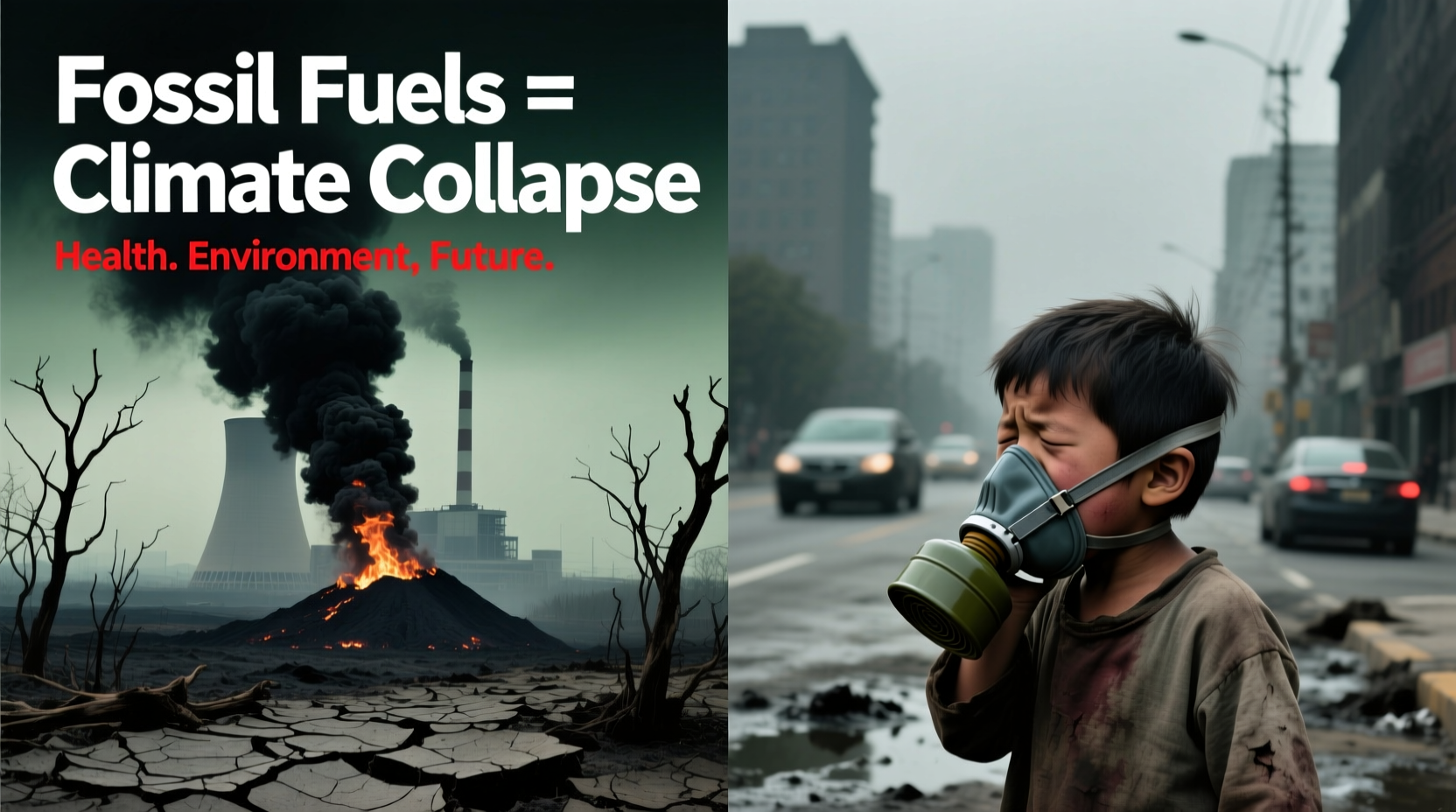Fossil fuels—coal, oil, and natural gas—have powered industrial growth for over a century. While they enabled technological progress and economic expansion, their long-term consequences now threaten planetary stability. The combustion of fossil fuels is the primary driver of climate change, air pollution, ecosystem degradation, and public health crises worldwide. Understanding their full impact is essential for making informed choices about energy policy, personal consumption, and environmental stewardship.
The Climate Crisis: Carbon Dioxide and Global Warming

Burning fossil fuels releases vast quantities of greenhouse gases, especially carbon dioxide (CO₂), into the atmosphere. Since the Industrial Revolution, atmospheric CO₂ levels have risen from approximately 280 parts per million (ppm) to over 420 ppm—a level not seen in millions of years. This buildup traps heat, leading to global temperature increases, shifting weather patterns, and more frequent extreme events like hurricanes, droughts, and wildfires.
According to the Intergovernmental Panel on Climate Change (IPCC), human activities have caused approximately 1.1°C of global warming above pre-industrial levels. Without significant reductions in emissions, temperatures could rise by 2.7°C or more by 2100, triggering irreversible tipping points such as ice sheet collapse and ocean current disruption.
Public Health Consequences of Air Pollution
Fossil fuel combustion doesn’t just warm the planet—it poisons the air people breathe. Power plants, vehicles, and industrial facilities emit pollutants including sulfur dioxide (SO₂), nitrogen oxides (NOₓ), particulate matter (PM2.5), and volatile organic compounds (VOCs). These substances contribute to respiratory diseases, cardiovascular conditions, and premature death.
The World Health Organization estimates that air pollution causes around 7 million premature deaths annually—making it one of the largest environmental health risks globally. Children, the elderly, and those with pre-existing conditions are particularly vulnerable. In urban areas near highways or coal-fired plants, asthma rates and hospital admissions spike during high-pollution days.
“Air pollution from fossil fuels is not just an environmental issue—it’s a public health emergency.” — Dr. Maria Neira, Director of Environment, Climate and Health at WHO
Environmental Degradation Across Ecosystems
The extraction and use of fossil fuels inflict widespread harm on natural ecosystems. Coal mining destroys forests and contaminates waterways with heavy metals. Oil drilling disrupts wildlife habitats and risks catastrophic spills, as seen in disasters like the 2010 Deepwater Horizon spill, which released nearly 5 million barrels of oil into the Gulf of Mexico. Fracking for natural gas pollutes groundwater and induces seismic activity.
Ocean acidification, driven by excess CO₂ absorption, threatens marine life. Coral reefs, vital nurseries for fish species, are bleaching at alarming rates. On land, deforestation for mining and pipeline construction fragments habitats and accelerates biodiversity loss.
| Fossil Fuel | Primary Environmental Impact | Long-Term Risk |
|---|---|---|
| Coal | Mining destruction, mercury contamination, acid rain | Soil infertility, poisoned water sources |
| Oil | Spills, habitat destruction, NOₓ emissions | Marine ecosystem collapse |
| Natural Gas | Methane leaks, fracking-induced earthquakes | Short-term climate forcing due to methane potency |
A Real-World Example: Asthma Rates in Houston, Texas
Houston hosts one of the densest concentrations of petrochemical refineries in the U.S. Communities adjacent to these facilities, particularly low-income neighborhoods and communities of color, experience disproportionately high asthma rates. A 2021 study by Rice University found that children living within two miles of major refineries were twice as likely to be hospitalized for asthma compared to city averages. This pattern reflects a broader environmental justice issue: marginalized populations often bear the brunt of fossil fuel pollution despite contributing least to its causes.
Economic and Social Costs of Fossil Fuel Dependence
The true cost of fossil fuels extends beyond environmental damage. Economically, societies pay through healthcare expenses, lost productivity, infrastructure damage from climate-related disasters, and subsidies that prop up outdated industries. The International Monetary Fund (IMF) estimated in 2023 that global fossil fuel subsidies reached $7 trillion annually when accounting for unpriced environmental and health damages.
Meanwhile, the volatility of oil prices destabilizes economies and fuels geopolitical conflict. Nations dependent on oil exports face economic uncertainty as markets shift toward renewables. Conversely, investing in clean energy creates more jobs per dollar than fossil fuels—particularly in solar, wind, and energy efficiency sectors.
Step-by-Step: Transitioning Away from Fossil Fuels
Reducing reliance on fossil fuels requires coordinated action across individual, community, and governmental levels. Here's a practical timeline for meaningful change:
- Year 1: Conduct an energy audit of your home; switch to a green energy provider if available.
- Year 1–2: Replace gasoline-powered vehicles with electric models or increase use of public transit and biking.
- Year 2–3: Advocate for local policies supporting renewable energy, building electrification, and sustainable urban planning.
- Year 3–5: Support divestment campaigns targeting institutions still funding fossil fuel projects.
- Ongoing: Educate others, vote for climate-conscious leaders, and reduce personal energy consumption through efficiency measures.
Action Checklist: Reducing Your Fossil Fuel Footprint
- Switch to a renewable electricity plan from your utility provider
- Upgrade insulation and windows to improve home energy efficiency
- Use programmable thermostats to minimize heating and cooling waste
- Choose walking, cycling, carpooling, or public transport over single-occupancy driving
- Support businesses committed to net-zero operations
- Reduce air travel and opt for virtual meetings when possible
- Install solar panels or participate in a community solar program
Frequently Asked Questions
Are natural gas and “clean coal” really cleaner alternatives?
No. While natural gas emits less CO₂ than coal when burned, its primary component—methane—is a potent greenhouse gas with over 80 times the warming power of CO₂ over 20 years. Leaks during extraction and transport undermine any climate benefit. “Clean coal” technologies like carbon capture remain largely unproven at scale and do not eliminate mining impacts or other pollutants.
Can renewable energy fully replace fossil fuels?
Yes—technologically, it’s feasible. Solar, wind, hydro, and geothermal sources already supply over 30% of global electricity. With advancements in battery storage, grid modernization, and demand management, a fully renewable system is achievable by mid-century. Countries like Iceland and Norway generate nearly all their electricity from renewables, proving the model works.
What role do governments play in phasing out fossil fuels?
Governments must implement policies such as carbon pricing, elimination of fossil fuel subsidies, investment in public transit and clean infrastructure, and enforceable emissions regulations. International cooperation, as seen in the Paris Agreement, is crucial for aligning global efforts and ensuring equity in the energy transition.
Conclusion: A Call for Urgent Action
The evidence is overwhelming: fossil fuels are fundamentally incompatible with a stable climate, healthy population, and thriving ecosystems. Their continued use jeopardizes future generations while perpetuating inequality and environmental injustice. But solutions exist. Every decision—to support clean energy, reduce consumption, or advocate for systemic change—contributes to a safer, more sustainable world.









 浙公网安备
33010002000092号
浙公网安备
33010002000092号 浙B2-20120091-4
浙B2-20120091-4
Comments
No comments yet. Why don't you start the discussion?